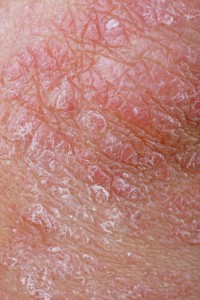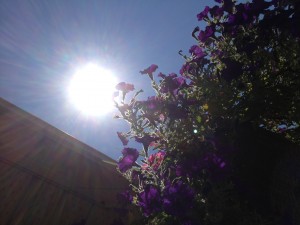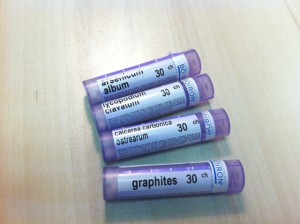Goodbye Summer – hello Psoriasis?
Those of you suffering from psoriasis may have seen significant improvement in your psoriasis during the summer months, mostly because of increased sun exposure, which is demonstrated to improve psoriasis. While phototherapy is a proven treatment for moderate to severe psoriasis, summer sunlight provides similar benefits.
But what to do when exposure to the sun is not as regular as it is in the summer? There are a number of natural treatments and preventative measures that will help ease the symptoms. Please read on below for some helpful hints. A homeopathic constitutional remedy that is completely individualized to your condition can give you long-lasting relief or even remove the condition altogether.
What exactly is psoriasis? It is a chronic, recurring skin disease
that affects the life cycle of skin cells. It causes cells to build up rapidly on the surface of the skin, forming thick silvery scales and itchy, dry, red patches that are sometimes painful.

Most types of psoriasis go through cycles, flaring for a few weeks or months, then subsiding for a time or even going into complete remission. In most cases, however, the disease eventually returns.
The condition tends to run in families, although it may not develop in those with a genetic predisposition. It can also be triggered by stress, emotional upsets, and exposure to certain stimuli such as medicines.
Psoriasis signs and symptoms often include:
- Red-or pink-colored spots or patches. Patches grow bigger and become covered with silver-colored scales
- Shedding of silvery scales to expose red patches beneath. Small spots of blood can be seen underneath
- Small pits in the nails. The outbreak can be so severe that the nail thickens and crumbles away
- Red, itchy plaques in the armpits, under the breasts, on the stomach, in the groin, or on the buttocks. The plaques are often infected by the yeast-like fungus Candida albicans.
- Scales on the scalp and matting of hair
There are several types of psoriasis including:
- Plaque psoriasis. The most common form, plaque psoriasis causes dry, raised, red skin lesions (plaques) covered with silvery scales. The plaques itch or may be painful and can occur anywhere on your body, including your genitals and the soft tissue inside your mouth. You may have just a few plaques or many, and in severe cases, the skin around your joints may crack and bleed.
- Nail psoriasis. Psoriasis can affect fingernails and toenails, causing pitting, abnormal nail growth and discoloration. Psoriatic nails may become loose and separate from the nail bed (onycholysis). Severe cases may cause the nail to crumble.
- Scalp psoriasis. Psoriasis on the scalp appears as red, itchy areas with silvery-white scales. You may notice flakes of dead skin in your hair or on your shoulders, especially after scratching your scalp.
- Guttate psoriasis. This primarily affects people younger than 30 and is usually triggered by a bacterial infection such as strep throat. It’s marked by small, water-drop-shaped sores on your trunk, arms, legs and scalp. The sores are covered by a fine scale and aren’t as thick as typical plaques are. You may have a single outbreak that goes away on its own, or you may have repeated episodes, especially if you have ongoing respiratory infections.
- Inverse psoriasis. Mainly affecting the skin in the armpits, in the groin, under the breasts and around the genitals, inverse psoriasis causes smooth patches of red, inflamed skin. It’s more common in overweight people and is worsened by friction and sweating.
- Pustular psoriasis. This uncommon form of psoriasis can occur in widespread patches (generalized pustular psoriasis) or in smaller areas on your hands, feet or fingertips. It generally develops quickly, with pus-filled blisters appearing just hours after your skin becomes red and tender. The blisters dry within a day or two, but may reappear every few days or weeks. Generalized pustular psoriasis can also cause fever, chills, severe itching and fatigue.
- Erythrodermic psoriasis. The least common type of psoriasis, erythrodermic psoriasis can cover your entire body with a red, peeling rash that can itch or burn intensely. It may be triggered by severe sunburn, by corticosteroids and other medications, or by another type of psoriasis that’s poorly controlled.
- Psoriatic arthritis. In addition to inflamed, scaly skin, psoriatic arthritis causes pitted, discolored nails and the swollen, painful joints that are typical of arthritis. It can also lead to inflammatory eye conditions, such as conjunctivitis. Symptoms range from mild to severe and psoriatic arthritis can affect any joint. Although the disease usually isn’t as crippling as other forms of arthritis, it can cause stiffness and progressive joint damage that in the most serious cases may lead to permanent deformity
The cause of psoriasis isn’t fully known, but it’s thought to be related to the immune system and its interaction with the environment in people who have the genetic susceptibility. More specifically, one key cell is a type of white blood cell called a T lymphocyte or T cell. Normally, T cells travel throughout the body to detect and fight off foreign substances, such as viruses or bacteria. If you have psoriasis, however, the T cells attack healthy skin cells by mistake, as if to heal a wound or to fight an infection.
Factors that may trigger psoriasis include:
- Infections, such as strep throat or thrush
- Injury to the skin, such as a cut or scrape, bug bite, or a severe sunburn
- Stress
- Cold weather
- Smoking
- Heavy alcohol consumption
- Certain medications — including lithium, which is prescribed for bipolar disorder; high blood pressure medications such as beta blockers; antimalarial drugs; and iodides
Natural Treatment for Psoriasis
Sun exposure

Sunbathing generally leads to an improvement in psoriasis but sun protection must be used. UVB exposure three times weekly is beneficial.
Diet

Eat foods that dispel dampness and heat, such as mung bens, watermelon peel, lotus root, red beans, banana, and grapefruit. Avoid foods that promote heat and dampness in the body, such as pepper, dried garlic, cloves, dried ginger, green peppers, leeks, green onion, and liver. Cut alcohol out of your diet as it worsens the condition by impairing function of the liver and gut tissues, increasing the amount of toxins that are absorbed by the body. Also eliminate gluten, found in wheat, barley, and rye. Psoriasis patients have been clinically proven to benefit from abstaining from gluten products. Eat a hypoallergenic diet. Stay away from corn, dairy and dairy products, and any other foods to which you may be allergic. Fresh fruits, vegetables, whole grains, and beans are high in fiber and will eliminate many gut-derived toxins, a process which is beneficial to those suffering from psoriasis.
Tip: Combine Treatments
For more severe and complicated cases of psoriasis, a combination of treatments that includes homeopathy and dietary therapy is recommended.
Getting enough sleep is also important.
Homeopathy
This type of condition should be treated by an experienced homeopathic practitioner. The best remedy is always your completely individualized constitutional remedy.
The homeopathic suggestions listed below give an idea of the sort of remedies that a practitioner might consider when treating a patient with this condition. On occasion, it may be possible to use an obviously well-indicated remedy to calm down a very mild, limited flare-up of psoriasis, but this is not to be encouraged as there is a risk that taking a homeopathic remedy that works only superficially over an extended period of time may suppress the underlying problem. There is also a risk of unwittingly aggravating symptoms by taking a remedy for too long.

Arsenicum album
This remedy can ease the soreness of rough, scaly skin that is so dry it looks like paper. Signature features include burning sensations and soreness as a result of scratching, symptoms that are eased by contact with warmth. Stress and anxiety noticeably aggravate skin problems, and skin eruptions may alternate with asthma.
Lycopodium
If dry, raw skin is combined with urinary or gastric problems when feeling physically rundown, use Lycopodium. Anticipatory anxiety (especially anxiety about being the focus of attention when, for example, giving a presentation) aggravate skin symptoms. Skin tends to feel sore and raw in areas of folds (for instance around the ears and/or the nose), while the skin on the hands and the soles of the feet can be especially dry.
Calc carb
Consider this remedy if skin is rough and scaly and becomes very readily cracked and chapped, especially in cold winter weather. The skin has a generally pale, unhealthy look to it with a tendency to become sweaty and clammy after the least physical effort, and is also slow to heal.
Graphites
This remedy is called for when areas of skin affected by psoriasis become very easily cracked, weepy, and bleed after scratching. Thickened, scaly sin weeps a yellowish-colored discharge that dries to a crust.
Prevention
Soaking in an oatmeal bath can feel soothing to taut, scaly areas of skin. Suspend a small muslin bag that has been filled (but not stuffed) with oats under the hot tap as the water is running. If stress is noticeably aggravating psoriasis symptoms, investigate stress-reduction and relaxation techniques that can be built in to your daily routine. Choices to consider include meditation, progressive muscular relaxation, yoga, Tai chi, and /or pilates.
We would be happy to answer your questions about this or any other article or service we provide. Please call the clinic at (519) 603-0505 to book your appointment or to reserve your free 15-minute information session.
Irene Schwens, C. Tran., DHMHS
Owner and Homeopath








